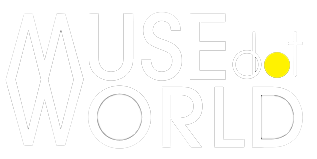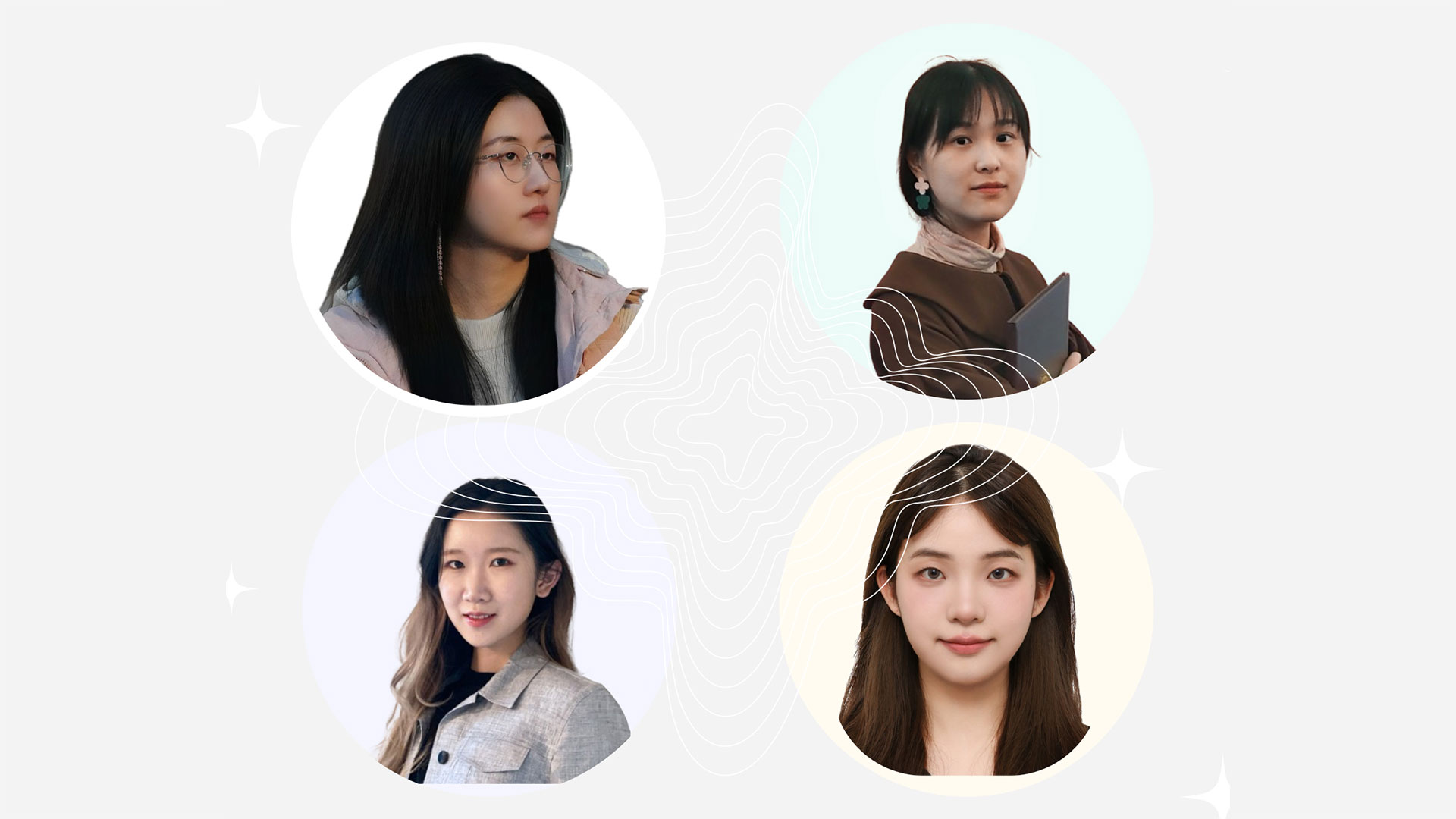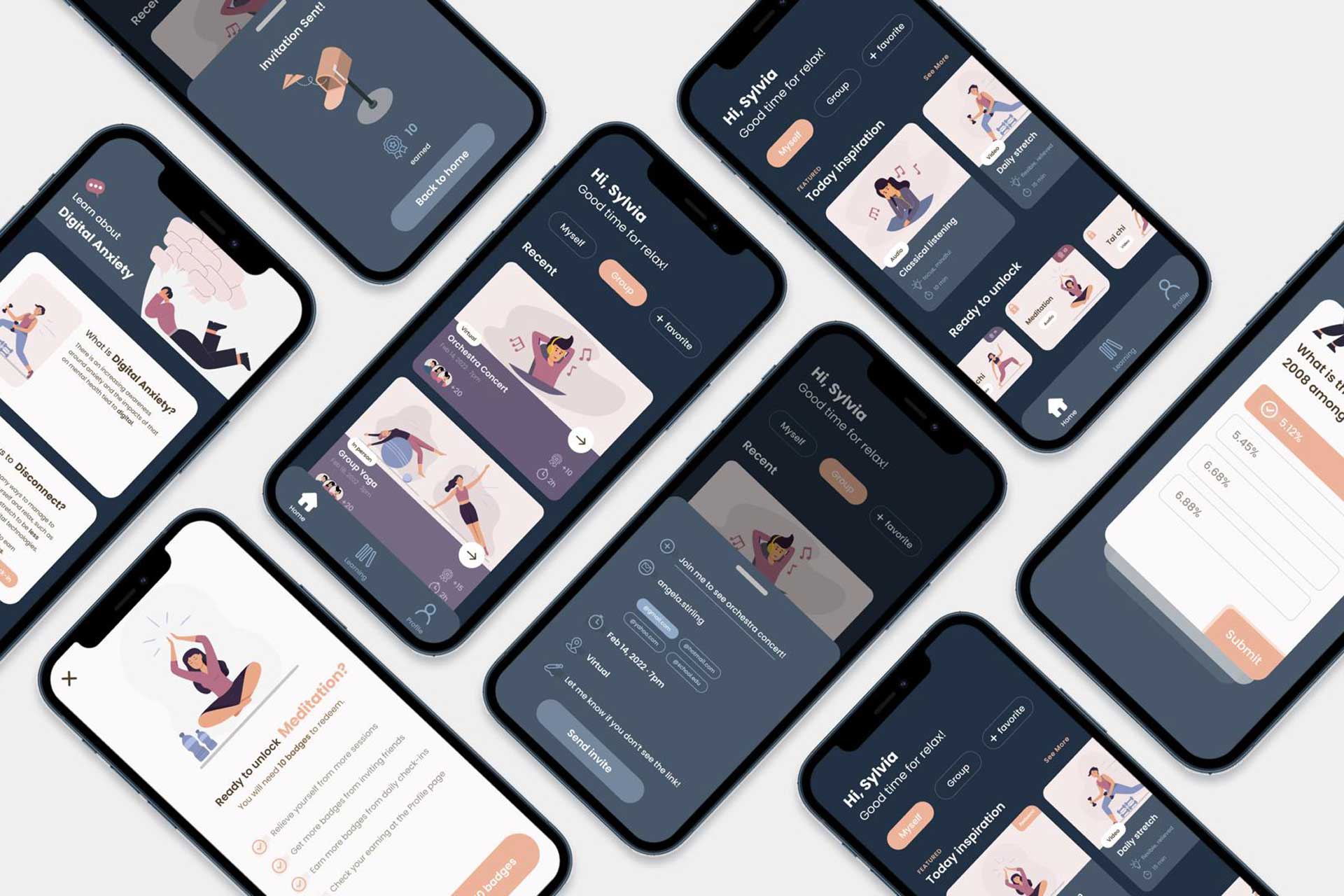Interview with TA Design Studio

Interview with Renyi Zhang & Xianming Sang
July 2, 2024
The Architectural Grandeur of Trojena Ski Village
July 2, 2024TA Design Studio
TA Design Studio is a collective of four talented individuals dedicated to their craft. They thrive on creating beautiful designs, finding joy and fulfillment in each of their artistic endeavors, and continuously pushing the boundaries of innovation and creativity.
Junru (Jennie) Xu: I am an award-winning product designer and UX lead, boasting eight years of rich experience in product design, user experience, and human-computer interaction. Currently serving as a Senior Product Designer at DIRECTV in Seattle, I spearhead a variety of pioneering projects that cater to over 11.3 million users across the United States.
My foundational role at Cayaba Care as the lead designer for the patient app project has significantly contributed to bridging the maternal health gap for over 60,000 U.S. women facing severe maternal morbidity by guiding the project from inception to fruition.
Zhongqi Fu: Hailing from Boston with a master's from Columbia University and five years in UX/UI, I am known for my ability to devise solutions that significantly enhance everyday life across various sectors. As a pivotal force at Electric Hydrogen Co., I lead the development of IoT enterprise products, aiming for zero emissions in the energy industry.
My co-founding role at TA Design Studio is to oversee my mentor budding designers, fostering their growth and career progression.
Zixi Liu: With my background as a therapist, I bring a unique empathy-driven approach to UX/product design, focusing on creating digital experiences that are intuitive, accessible, and inspiring.
At VMware, I contribute to designing enterprise-level solutions that redefine the landscape of software development, while my tenure at Sibel Health was marked by designing comprehensive healthcare solutions to seamlessly connect patients, clinicians, and researchers.
Yiwen Chen: I am a UI/UX designer from the School of Visual Arts, who delves deeply into mental health and societal issues, aiming to cultivate a more empathetic and inclusive community through my designs. My work embodies a commitment to addressing these critical themes, reflecting a vision for a kinder society.
We thrive on crafting beautiful creations because they fill us with joy and fulfillment. As creative professionals in UX design, we sit at the crossroads of creativity, technology, and psychology. This unique blend allows us to enact significant changes through our work, solving problems and enhancing lives.
Our dedication and innovative spirit are key in transforming the world, and elevating daily experiences to new heights of enjoyment. This underscores our commitment to excellence and our role in enriching the human experience, making it more intuitive and enjoyable.
TA Design Studio is dedicated to offering top-notch design services in areas like mentorship, architecture, graphic/web design, UX/UI design, and product design. We aim to stay current with the latest trends and knowledge in the design world. By doing so, they pass on fresh perspectives and insights to their students, helping them establish long-term career goals.
We aim to create a future where creativity leads to positive social change. We focus on impactful design innovations, creating experiences that not only look to the future but also address today's social challenges.
Design transforms our imaginations into reality, bridging the gap between the conceptual and the tangible, across both physical and digital realms. It breathes life into our ideas, impacting every facet of our existence. Through design, we communicate beyond words, employing colors, shapes, and spaces to convey emotions and messages, crafting experiences that resonate. It demands a deep empathy to truly understand and cater to the unspoken needs and desires of people.
Moreover, design mirrors societal values and trends, evolving to address emerging challenges and embrace technological advancements. It engages in an ongoing dialogue with the world, adapting to shifts in how we interact. Design is forward-looking, not only addressing immediate issues but also anticipating and innovating for future demands in ways that are both practical and inspiring. Essentially, design is about fostering connections.
The minimalist design is a popular concept known for its deep impact and sleek look. It focuses on simplicity, clean lines, and often uses a monochromatic color scheme, following the idea that "less is more". By removing unnecessary elements, it aims for both practical use and clear beauty.
This style is appealing because it brings a sense of peace and organization, making spaces and products easier to use and more welcoming. It shows that simplicity can bring out beauty and functionality together, making a strong connection with users in a straightforward way. Minimalism is special for its ability to say more with less, offering a unique challenge but also great rewards in design.
Our design style meticulously balances functionality with aesthetics, aiming to address user problems while ensuring an outstanding interaction experience. We center our approach around the user, making every design decision with usability and accessibility in mind.
By embracing a minimalist ethos, our designs highlight functional elegance, where every element serves a specific purpose and contributes to the overall visual appeal. We are dedicated to creating interactions that are intuitive and seamless, enhancing the user experience through a thoughtful layout and responsive design.
Our work is driven by a strong problem-solving approach, meticulous attention to detail, and a commitment to sustainability and adaptability. This ensures that our designs are not only impactful and meaningful today but also ready to adapt to the future's challenges and opportunities.
Receiving the MUSE Design Awards is an immense honor and a profound affirmation of our dedication, creativity, and hard work. For us, this accolade is not just a recognition of the aesthetic appeal or innovation of our design; it symbolizes the impact and relevance of our work in addressing critical societal issues through thoughtful design.
This award is particularly meaningful because it highlights the significance of the Yo-Yo project, a design solution focused on enhancing children's mental health and strengthening family bonds despite geographical distances. It validates our approach to blending traditional elements with modern technology to create a product that is both engaging for children and supportive of parents, reinforcing the importance of mental health and emotional well-being in today.
We chose to enter this project into the MUSE Design Awards for several reasons. First and foremost, the Yo-Yo project embodies our commitment to addressing pressing societal issues through thoughtful design. It tackles the often-overlooked area of children's mental health, offering a solution that bridges the gap between technology and emotional care in a tangible, accessible manner.
This project also reflects our innovative approach to design, merging traditional play with advanced technology to create a product that is both useful and emotionally resonant.
Additionally, the Yo-Yo project is representative of our holistic design philosophy, which prioritizes user-centric solutions and social responsibility. By entering this project into the awards, we aimed to highlight the importance of design thinking in solving real-world problems and to inspire others in the design community to consider how their work can contribute to societal well-being.
Winning the award not only provided recognition for our team's hard work and creativity but also offered a platform to raise awareness about the importance of mental health support for children. It reaffirmed our belief in the power of design to make a significant impact on individuals' lives and society at large, motivating us to continue exploring innovative solutions to complex challenges.
During the design process of the Yo-Yo project, we navigated through several challenges to create a product that was not only innovative but also deeply meaningful and engaging for children. These challenges included:
Balancing Playfulness with Functionality: Our primary challenge was to design a device that captivated children through its playfulness while also serving a functional role in health monitoring. Through extensive user research, we designed the Yo-Yo to be both a fun object and an effective health monitoring tool, ensuring it was engaging for children and useful for parents.
Integrating Advanced Technology in a Child-Friendly Design: Incorporating health monitoring sensors and connectivity in a design appealing and safe for children required careful selection of materials and technologies. Collaborating with engineers and child psychologists helped us achieve a balance between technical sophistication and child-friendliness.
Ensuring Privacy and Security: With the device handling sensitive health data, ensuring robust data protection was paramount. We implemented industry-best encryption and data security practices to safeguard users' information, addressing the critical concern of privacy and security for both children and parents.
Distinguishing Our Design in a Crowded Market: Amidst a sea of connected health devices, making the Yo-Yo stand out was essential. We focused on the device's dual nature as both a playful toy and a health monitor, inspired by children's multifaceted daily activities.
Our research on children's behaviors led to the Yo-Yo's three functional states: as a clock during study times, as a traditional Yo-Yo for play, and as a communication tool for exchanging voice messages with parents. We also leveraged colors and facial expressions to intuitively display mood and health statuses, catering to children's attraction to visual stimuli and making health monitoring an engaging experience.
By addressing these challenges with a user-centric, research-driven approach, we developed the Yo-Yo project to be a multifunctional device that stands out for its ability to combine fun, functionality, and emotional support. This blend of features not only makes the Yo-Yo unique in the market but also reinforces our commitment to creating design solutions that have a positive impact on users' lives.
Winning the MUSE Design Awards marks a transformative milestone for us, enhancing our visibility and credibility within the design community and opening doors to new opportunities and collaborations that were previously out of reach.
This recognition serves as a profound vote of confidence, affirming our approach to creating innovative and impactful designs, and motivates us to continue pushing the boundaries of what's possible in design. It expands our professional network, connecting us with industry peers and leaders, enriching our journey and fostering collaborative opportunities for growth.
Moreover, this award provides us with a platform to advocate for the causes we are passionate about, particularly in using design to address societal challenges, thereby amplifying our impact. Encouraged by this achievement, we are inspired to pursue continuous learning and experimentation, honing our skills and deepening our commitment to contributing positively to the world through thoughtful and meaningful design.
First and foremost, the boundless opportunity for creative problem-solving truly captivates us. Design is inherently about finding innovative solutions to problems, often in ways that defy conventional thinking. This aspect of design allows us to dive deep into a creative process where every challenge is a puzzle waiting to be solved with imagination, intuition, and ingenuity.
It's not merely about creating something that looks good; it's about crafting solutions that are transformative, enhancing usability, and bringing joy and convenience to users' lives. The thrill of turning abstract ideas into tangible realities that can positively affect people's experiences is immensely gratifying.
Secondly, the emphasis on user-centered design deeply resonates with us. This philosophy places the user's needs, emotions, and behaviors at the core of the design process, making our work not just functional but empathetically aligned with the people it's intended for. It involves a deep dive into understanding the nuances of human interaction with products and services, ensuring that every design decision we make serves to improve the user's experience.
This approach instills our designs with a sense of purpose and relevance, forging connections between humans and the designed world in a way that is intuitive, accessible, and meaningful. It challenges us to think from multiple perspectives, fostering a design ethos that is as compassionate as it is creative.
Lastly, the dynamic, ever-evolving landscape of the design industry is exhilarating. The constant influx of new technologies, methodologies, and trends means the learning never stops. This perpetual motion of the industry keeps us on our toes, pushing us to continuously refine our skills, experiment with new tools, and stay abreast of emerging trends.
It's a landscape where change is the only constant, offering an exciting challenge to innovate and adapt. This evolution not only fuels our growth as designers but also ensures that our work remains at the cutting edge of what's possible, making every day a new opportunity to explore, learn, and grow.
Our team think over the next 5-10 years, the design industry will undergo significant evolution driven by technological advancements and changing societal values. Sustainable design practices will become standard, alongside increased integration of AI and automation tools into the design process.
Augmented and virtual reality technologies will revolutionize design visualization, while personalized and adaptive design approaches will cater to individual user needs. Cross-disciplinary collaboration will be essential, and designers will prioritize creating solutions that promote well-being and reflect global cultural diversity. Embracing innovation and human-centered principles will be crucial for designers navigating this dynamic landscape.
Our recommendation is to prioritize refining your expertise by consistently improving your skills and keeping abreast of industry trends and technologies. Develop a thorough comprehension of design fundamentals, user requirements, and market dynamics, while fostering creativity and innovative thinking.
Adopt a collaborative approach, actively seeking feedback and knowledge-sharing opportunities within the design community, and be open to experimentation and calculated risks. Most importantly, maintain enthusiasm and commitment to your craft, allowing your distinct perspective and voice to illuminate your design endeavors.
We suggest focusing on mastering your craft through continual skill enhancement and staying updated on industry trends and technologies. Understand design principles, user needs, and market demands deeply while nurturing creativity and thinking outside the box.
Embrace collaboration, seek feedback, and don't hesitate to experiment and take risks. Above all, stay passionate and dedicated, letting your unique perspective shine through in your designs.
Winning Entry
YO-YO | 2024
YOYO, an intelligent assistant utilizing AI and voice technology, fosters enhanced communication between parents …
(Read more at MUSE Design Awards)
TA Design Studio
TA Design Studio is a collective of four talented individuals dedicated to their craft. They thrive on creating beautiful designs, finding joy and fulfillment in each of their artistic endeavors, and continuously pushing the boundaries of innovation and creativity.
Read more about TA Design Studio's interview for the 2024 MUSE Creative Awards!


